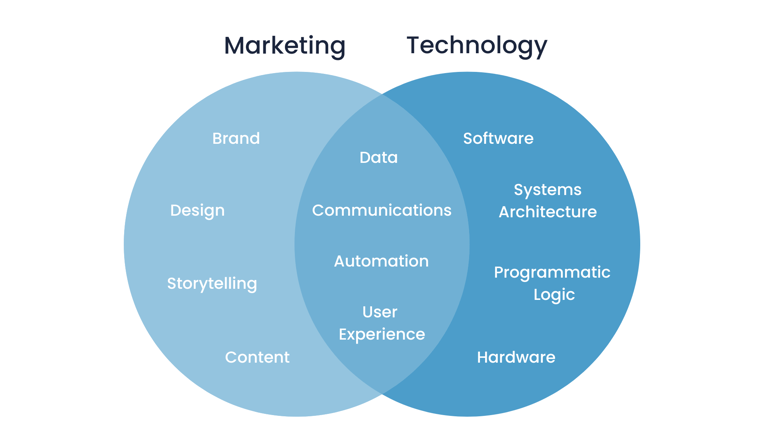I’m changing things up with this blog post and want to warn you: This is a bit of a rant. It has just happened one too many times and someone needs to stand up and defend the marketing profession. Marketing is a skilled profession, just like many others. So why is it that some people assume that anyone can “do marketing,” regardless of if they’ve had formal training, education, and work experience, or not?
Let me give you a quick example. In a former role I held, the owner of the company came to me and told me in great detail about his talented personal trainer, who had a great personality and could use some part time work. As I pondered why he was telling me this story, he then asked “Can’t you just create a spot for her in marketing? I’m sure she could do a great job.”
What?!
I know I’m not alone in this experience either. Too many of my colleagues have reported a similar experience. The Event Manager who was hired because they had a "great personality" when selling the owner of the company an iPhone, the Campaign Manager that happens to be the vice president's niece who had a knack for drawing in high school... I could go on and on. But let’s put it in perspective with a couple of questions:
- Would you ask your doctor to change the oil in your car?
- Would you want an aerospace engineer catering your wedding?
- Would you want your aesthetician doing your taxes?
(Even if they did stay in a Holiday Inn the night before?)
Why would people have the impression that marketing was something easy? That it’s so easy that anyone could do a decent job at it regardless of their experience or training? Maybe it’s because of all the Dilbert cartoons in the 90's or more likely it’s the way we used to define marketing and the activities a marketer used to do. Historically, marketing was most associated with advertising and therefore people with a creative mind. But that’s only one small part of marketing.
The Original 4 P’s of Marketing:
- Product: What am I making and why? Who am I making it for? What is it?
- Price: What will I charge for it?
- Place: Where will I sell it? Not just brick and mortar; think channels, think e-commerce, etc.
- Promotion: Advertising – This is NOT all of marketing!
Which later became the 7 P’s of Marketing:
- People: These are your employees. They are a part of marketing because every time they communicate with a customer, they are a reflection of your brand.
- Process: What sort of coordination is necessary to receive your product? Your process is every step between your product and the consumer and every step offers yet another touch point that either positively or negatively affects your brand.
- Proof: Your proof is the tangible evidence of your product. A box of cereal, straight teeth, and shipping notifications are all considered “proof” that the consumer received the product. And if they are ugly, hard to use or simply don’t work… well you know what happens then.
All of these were designed, debated, and taught well before Web 2.0 (1999-2004) and well before Google became a verb (it was added to the Merriam-Webster Collegiate Dictionary in 2006). This is really when buyer behavior, both B2B and B2C, changed and marketing had to change with it.
In a nutshell; marketing and IT collided! And with that emerged a whole new area of marketing. The middle ground, the overlap on the diagram below:

What does this mean to you and your business?
It means that there are so many new roles to fill in your marketing department. Here are just a few to give you an idea of the level of expertise that is required to keep up with today’s evolved, digital prospect:
- The Chief Marketing Officer (CMO): Strategic and integral to your company’s overall plan and absolutely a key member of the C-suite.
- Marketing Technologist/Operations Coordinator: Designs and manages the way sales and marketing systems connect, pass data, and reports on overall marketing efficacy.
- Marketing Data Analyst: Experts in quantitative and qualitative market analysis. They excel in identifying key market statistics, interpreting findings, and finding connections that inform future initiatives and campaigns.
- Content Strategist/Creator: In charge of creating and maintaining editorial calendars, style guides, and taxonomies, typically a combination of inbound and outbound content efforts(from blogs to direct marketing - what are we writing about and why?).
- Digital Marketing Manager: Developing, implementing, and managing marketing campaigns that promote an offer or a company, enhancing digital brand awareness, and driving traffic, engagement, and acquiring leads/customers.
- SEO Strategist/Coordinator: Handling and designing the SEO strategy of the business, plus ongoing management of the company’s presence with all the different search engines.
- Social Media Strategist/Coordinator: Designing social media strategies, managing, creating and publishing original, high-quality content, and administering all company social media accounts (responding to followers).
And here’s what else this all means to your business. You need a qualified team of marketing professionals if you are going to scale your business. Not everyone is going to read this and believe me but hopefully, I’ve made a few of you stop and think about the profession of marketing a little differently.
At the end of the day you could tell your boss or business partner about all of these new roles and responsibilities that fall into marketing and they could still turn around and ask you if you can stop talking and order some golf balls with company logos on them (yes; that’s happened to me too), but maybe they’ll be ready to bring on, or at least consider starting to build, a Modern Marketing Department.
So it’s really a "maybe". Your sister, friend, nephew, cousin, etc. can’t have a job in marketing… unless they are qualified. 😉



.png?width=700&name=content-3679757_640%20(1).png)

